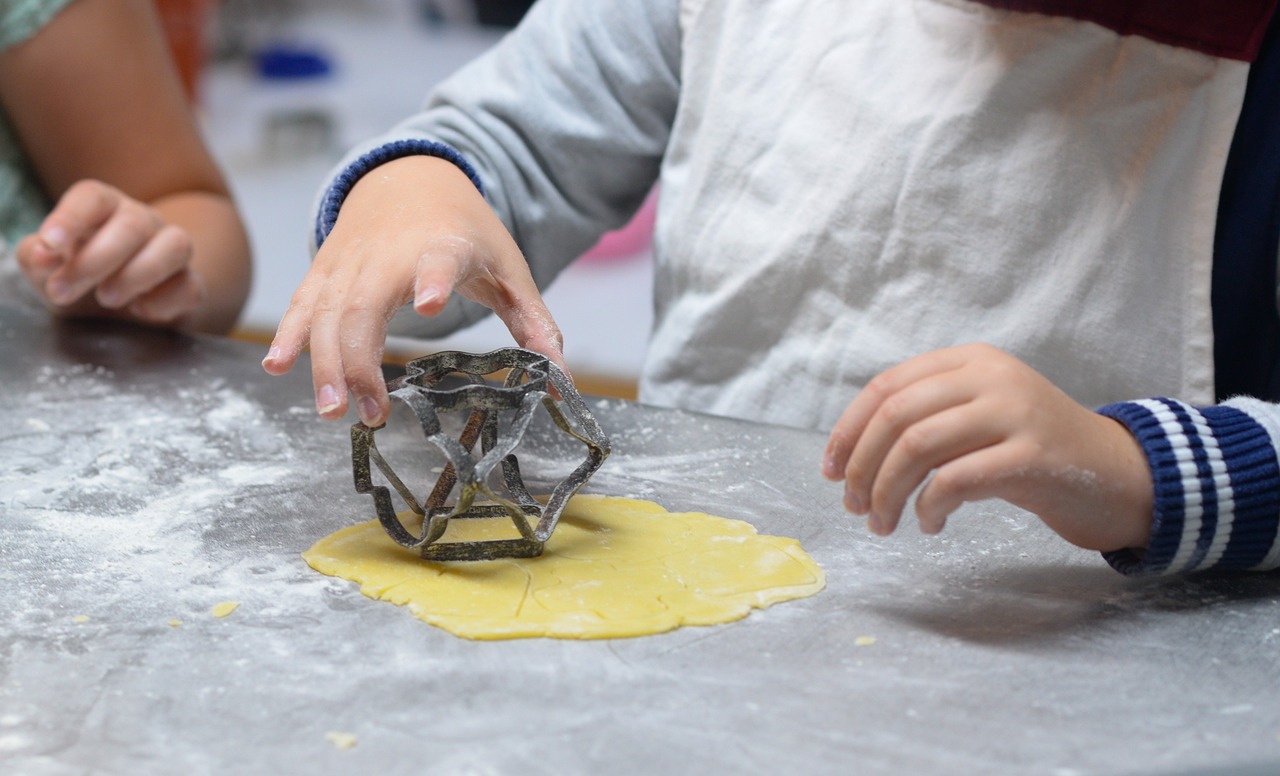Discover the joy of baking with your 2-year-old as you explore the benefits of engaging them in age-appropriate tasks, promoting their developmental growth, and creating lasting memories together.
Introduction: Exploring the Joy of Baking with 2-Year-Olds
Engaging in baking activities with a 2-year-old is not only a fun and enjoyable experience but also a valuable opportunity to promote their holistic development. The process of baking with toddlers offers a range of benefits that contribute to the child’s physical, cognitive, and emotional growth, creating a memorable and enriching experience for both the child and the parent or caregiver.
Baking with toddlers allows them to explore their senses through tactile experiences, such as touching and mixing ingredients, and sensory exploration, such as smelling and tasting different flavors and textures. These sensory activities play a crucial role in their overall development, fostering their cognitive abilities and promoting a deeper understanding of the world around them. Additionally, the act of measuring and pouring ingredients during baking enhances their fine motor skills, hand-eye coordination, and understanding of basic mathematical concepts, laying a foundation for future learning and cognitive development.
Furthermore, the collaborative nature of baking with a 2-year-old promotes positive parent-child interactions, creating a nurturing and supportive environment for the child. Through shared experiences in the kitchen, young children develop a sense of responsibility, independence, and confidence as they actively participate in involving a toddler in baking. These interactions also provide an opportunity for open communication, bonding, and the establishment of positive associations with food and meal preparation, which can have a lasting impact on the child’s relationship with nutrition and cooking as they grow older.
In summary, involving 2-year-olds in baking activities presents a wealth of benefits, from sensory exploration to fostering positive interactions and developmental growth. It’s a wonderful opportunity to create lasting memories while nurturing the child’s creativity and curiosity in a supportive and engaging environment.
Benefits of Baking with Toddlers
Engaging in baking activities with toddlers can significantly enhance their fine motor skills, sensory exploration, and creativity, contributing to their overall development. For example, when toddlers are involved in tasks such as mixing ingredients or decorating cookies, they are refining their fine motor skills and hand-eye coordination, which are essential for their cognitive and physical development.
Additionally, baking serves as a valuable educational tool, exposing children to the basics of food, nutrition, and essential life skills. As they help measure ingredients or learn about different food groups, toddlers are gaining practical knowledge that can benefit their long-term understanding of healthy eating habits. This hands-on experience can lay the foundation for a positive relationship with food and cooking as they grow older, promoting a healthy lifestyle.
Moreover, engaging in baking activities can foster positive parent-child interactions, creating a nurturing and supportive environment for young children. When toddlers participate in the baking process alongside their parents or caregivers, it strengthens the bond between them and provides an opportunity for quality time together. This shared experience can contribute to a sense of security and belonging for the child, promoting [emotional well-being](https://www.thetalkativecookieco.Found solution by allowing toddler to help with icing and sprinkles. These moments of collaboration and encouragement can also instill a sense of accomplishment and confidence in toddlers as they contribute to the baking process.
Suitable Baking Tasks for 2-Year-Olds
When it comes to baking with 2-year-olds, it’s essential to identify suitable tasks that align with their abilities and developmental stage. Toddlers can actively engage in age-appropriate activities, such as pouring pre-measured ingredients into a mixing bowl, stirring batter or dough, and providing assistance in simple decorating tasks. These tasks not only allow them to be hands-on in the baking process but also contribute to the development of their fine motor skills and hand-eye coordination. For instance, pouring ingredients into a bowl can help toddlers refine their pouring skills and develop a sense of control over their movements, while stirring and mixing can enhance their hand-eye coordination and muscle strength.
Moreover, involving toddlers in baking activities instills a sense of responsibility and independence. When children are given specific tasks to accomplish within the baking process, they experience a sense of achievement and contribution, fostering their growing independence and self-confidence. Additionally, baking with toddlers under proper supervision ensures a safe and enjoyable experience for both the child and the caregiver. It creates opportunities for positive parent-child interactions and promotes a nurturing environment where the child can explore, learn, and create lasting memories. By establishing clear and simple guidelines, caregivers can effectively involve toddlers in baking, nurturing a love for cooking and baking from an early age.
By incorporating suitable baking tasks for 2-year-olds, caregivers can create a delightful and interactive baking experience, fostering the child’s development and strengthening the bond between the child and the caregiver. These tasks not only contribute to the child’s growth and independence but also lay the foundation for a lifelong love of baking and cooking.
Toddler-Approved Baking Recipes
When it comes to baking with 2-year-olds, the key is to opt for simple and quick recipes that cater to their short attention spans while still allowing them to actively participate in the process. Cookies, muffins, and brownies are excellent options that align perfectly with these criteria. For instance, making chocolate chip cookies can be an exciting and interactive activity for toddlers. They can help with tasks such as pouring pre-measured ingredients into the mixing bowl, stirring the cookie dough, and placing cookie dough balls onto the baking sheet. This hands-on involvement not only keeps them engaged but also enhances their fine motor skills and sensory exploration.
In addition to cookies, baking blueberry or banana muffins can also captivate a 2-year-old’s interest. They can assist in mashing the ripe bananas, mixing the batter, and adding blueberries to create a delightful treat. These simple tasks contribute to their sense of responsibility and independence, providing a valuable learning experience in a safe and enjoyable environment. Moreover, allowing toddlers to sprinkle chocolate chips on top of the muffins or create a decorative pattern with the blueberries fosters their creativity and imagination, making the baking process an enriching and rewarding activity for both the child and the caregiver.
Tips for Baking with Toddlers
When it comes to baking with toddlers, keeping them engaged throughout the process is key to a successful and enjoyable experience. One effective strategy is to incorporate interactive storytelling, where you can weave the baking steps into a fun and engaging tale, capturing your child’s imagination and keeping them involved in the activity. Additionally, playing cheerful and upbeat music in the background can create a lively atmosphere, making the baking process more enjoyable for both you and your toddler. These simple yet effective strategies can help maintain your toddler’s interest and enthusiasm, ensuring a positive baking experience.
Furthermore, it’s important to address concerns about potential messes when baking with young children. Embracing the inevitable chaos that may come with involving toddlers in baking activities is part of the journey. By providing age-appropriate kitchen tasks and offering structured yet flexible involvement, you can empower your toddler to actively participate while ensuring a safe and enjoyable experience for both of you. This approach allows your child to feel a sense of responsibility and independence, fostering a nurturing and supportive environment that encourages positive parent-child interactions. By embracing the mess and involving your toddler in age-appropriate tasks, you can create lasting memories and instill a love for baking from a young age.
Engaging in Role-Play Activities
Engaging in role-play activities while baking with toddlers not only fosters imagination and creativity but also plays a significant role in their overall development. For example, pretending to be a chef or a baker can stimulate a child’s imagination, allowing them to explore different roles and responsibilities in a fun and educational way. This imaginative play within the context of baking can further promote cognitive and social development by encouraging children to communicate, collaborate, and problem-solve as they play different roles in the kitchen.
Incorporating role-play activities in baking with toddlers creates a playful and enriching environment that contributes to their holistic growth and learning. For instance, setting up a pretend bakery or hosting a tea party with stuffed animals while baking can enhance the child’s social skills and emotional development. These role-play scenarios not only make the baking experience more enjoyable but also provide opportunities for toddlers to learn about sharing, taking turns, and expressing their creativity in a safe and supportive setting. By encouraging such imaginative play, parents can create lasting and meaningful memories while supporting their child’s developmental journey in a fun and interactive way. [4]
Conclusion: Embracing the Journey of Baking with Young Children
In conclusion, involving 2-year-olds in baking activities offers a multitude of developmental and educational benefits, positively impacting their overall growth and well-being. Baking with toddlers not only enhances their fine motor skills, sensory exploration, and creativity, but also serves as a valuable educational tool, exposing children to food, nutrition, and essential life skills. This interactive experience creates lasting memories and fosters positive parent-child interactions, nurturing a supportive environment for young children.
Furthermore, encouraging imaginative play within the context of baking can further enhance the child’s overall experience, promoting cognitive and social development. For example, engaging toddlers in role-play activities such as using toy kitchen tools or pretending to be a chef can stimulate their imagination and creativity, contributing to their holistic growth and learning.
To explore a delightful array of toddler-friendly baking recipes and resources, readers are encouraged to visit The Talkative Cookie Co.’s website at The Talkative Cookie Co. for a joyful baking journey with their little ones. This resource provides a wide range of recipes specifically designed for toddlers, fostering a love for baking and creating lasting memories with young children.


